
UNC MPA is excited to welcome 64 new students in fall 2024—with 29 joining the on-campus format and 35 enrolling in our online format. These students hail from Washington State to Washington D.C., representing different interests and academic backgrounds and professional goals.
They are unified in their pursuit for an excellent education among like-minded leaders who are committed to impacting communities, governments, and organizations that serve the public for the better. Meet a few of them below!
Carlos Morales
Hometown: Columbia, SC
Undergrad Degree and Alma Mater: BA in Public Health, with a major in Food Systems, Nutrition and Health and University of Washington
Areas of Interest: Food and Environmental Policy, rooted in social and racial justice

Q: Why the MPA? How did you decide it was the right degree for you and your career goals?
Over the past decade, I have been on a path of public service that has continually evolved, from owning a restaurant and serving community members to serving as a food educator with AmeriCorps and teaching kids how to grow and cook the food from the school garden. Next, I would find myself farming, learning regenerative practices, and working to reconnect to the land and my body. This path brought me to the local food bank in Bellingham, WA, where I would serve on the Board of Directors for the past two years, serving the community and trying to discover how we can better meet the needs of the people who use us a resource. All of these steps along the way were driven by relationship building, learning, and hearing one another’s journey. These experiences helped to reconstruct my focus and illuminate a new path forward, focusing on my goal of policy reform and having a seat at the table to imagine how we can deconstruct and reestablish policies that better serve the communities they are trying to impact. Gaining an MPA will help prepare me with the tools necessary to help facilitate, lead, and construct the change I’d like to see and will prepare me to be a public service leader and beyond.
Q: There are lots of places out there to get your MPA. How did you end up at Carolina?
I appreciate that Carolina’s MPA program has a focus on local government. To me, local government is where a lot of policy and programming gets to be practiced and implemented firsthand. Being involved with the public sector on a local level gives you the opportunity to have relationships with the community you serve and allows for more robust interventions and systemic change, identifying gaps and working together to bridge the change that’s needed. UNC’s dedication to the state and local government will give me the required knowledge and help illuminate each sector’s nuances, privileges, and barriers. Carolina will build my confidence around scalability and prepare me to help our systems better reflect the city and the people we serve.
Q: Is there a class or professor or experience you are looking forward to in the program?
I’m looking forward to getting to know our cohort and professors. One thing that stood out about the MPA program was how tight the cohort size was. I’m excited to develop my relationships with everyone, dive into discussions, and learn from one another.
Q: Last question for fun, what are you currently reading or listening to?
I’m currently reading What It Takes to Heal: How Transforming Ourselves Can Change the World by Prentis Hemphill.
Andrea Sheetz
Hometown: Olmsted Falls, Ohio
Undergrad Degree and Alma Mater: Bachelors in Economics and Sociology from Elon University
Current job title/Employer: Workforce and Economic Development Administrator at Forsyth County Government
Areas of Interest: Public-private partnerships, strategic planning in local government

Q: Why the MPA? How did you decide it was the right degree for you and your career goals?
In undergrad I studied systemic social and economic disadvantages and often saw the public sector as a solution to those issues through policy revision and assistance programs, but only when led and managed effectively. In my current role, I collaborate with many businesses, educational institutions, and non-profits around helping the private sector find a talented workforce, ensuring jobs in our community are accessible through training programs, and that wrap-around supports are adequately funded and meeting the needs of their target population. I regularly make and see decisions around funding, policy language, and eligibility criteria that can determine a program’s success in helping the community. Earning an MPA will enhance my ability to affect change in my current community, hone my professional interests and talents to learn where I can be the most effective leader, and help me develop the skills and resources necessary to succeed in a variety of settings.
Q: There are lots of places out there to get your MPA. How did you end up at Carolina?
When working with County management on a new project or issue, one of the first questions our leadership asks is “What does the School of Government have to say about that?” I have frequently seen the School of Government serve as the preeminent expert on local government leadership and policy in North Carolina. It is clear this institution and program understands the importance of, continually invests in, and stays committed to public servants. I have been fortunate to find a variety of mentors in my organization and across my community whose perspective and dedication to public service I deeply admire, all of whom have received their MPA from Carolina. From my current director calling a former faculty member to get his advice on legal housing solutions, to classmates of a former County manager attending his retirement celebration, the relationships I am looking forward to building in this program will go beyond graduation and shape my career for years to come.
Q: Is there a class or professor or experience you are looking forward to in the program?
I am most looking forward to the applied research problem! There are many topics in my day-to-day work I want to dive deeper on and can’t wait to have that opportunity with the expertise of scholars and other practitioners.
Q: Last question for fun, what are you currently reading or listening to?
Recently my music has been a rotation of Lord Huron, Maggie Rogers, and the new Glass Animals album. I just finished reading Never Let Me Go by Kazuo Ishiguro and am in the middle of Real Americans by Rachel Khong.
Kara Morton
Hometown: Milton, Florida (currently resides in Raleigh, NC)
Undergrad Degree: BS Criminal Justice, concentration in Homeland Security
Alma mater: North Carolina Central University, Eagle Pride!
Civilian Job Title: Federal Police Officer for the Department of Veterans Affairs, United States Army Reserves Seargant First Class (SFC)
Areas of Interest: Military Police & Anti-Terrorism/ Force Protection Advisor

Q: Why the MPA? How did you decide it was the right degree for you and your career goals?
My earliest memories are of my parents’ selfless service to others, which sparked a desire in me to serve others from a young age. My experience in the U.S. Army and law enforcement has not only deepened this commitment but also ignited a passion for public service leadership. With an Master’s in Public Administration (MPA), I aim to become a skilled leader prepared to apply policy that effectively addresses complex issues in public service. My ultimate aspiration is to join the Department of Homeland Security Advisory Council (HSAC), where I can leverage my unique blend of military, law enforcement, and academic expertise to recommend and implement vital security policies that benefit both the private and public sectors.
Q: There are lots of places out there to get your MPA. How did you end up at Carolina?
Easy question! Carolina has a rich history of public service and reputation of leadership excellence and policy. From the faculty to advisors, and even alumni- I am confident that I am among likeminded driven leaders who are committed to my academic and professional growth. The thought of being apart of a supportive and collaborative community, excites me as I look forward to the fall semester.
Q: Is there a class or professor or experience you are looking forward to in the program?
Absolutely, I am thrilled to have the opportunity to attend Leadership Courses under Dr. Morse, an expert in Public Administration and Leadership and to be a part of the MPA Immersion experience. The immersion experience will provide a valuable opportunity to network and learn from seasoned professionals, who currently work in the government sector.
Q: Last question for fun, what are you currently reading or listening to?
Currently, I’m reading The Serving Leader Jennings and Stahl-Wert (2016), which has been a really impactful book for me. I’ve only made it to the fourth chapter so far, but I’m already seeing a lot of relevance to my own leadership style and goals.
Noah Champion
Hometown: Ellenboro, NC
Undergrad Degree and Alma Mater: Bachelor of Arts in History, North Carolina State University
Current job title/Employer: Procurement Intern with the North Carolina Department of
Administration
Areas of Interest: Local Government & Economic Development

Q: Why the MPA? How did you decide it was the right degree for you and your career
goals?
Throughout undergrad, I knew that I wanted to pursue a career in public service and find
a way to better my community but I tossed around how. Following an internship with the City of Gastonia, I fell in love with local government work and discovered the MPA. After extensive research, I realized how versatile the degree is and how I could make a real impact on my community and others. Along with that, the degree itself will allow me to pursue a career where I feel fulfilled in the work that I am doing.
Q: There are lots of places out there to get your MPA. How did you end up at Carolina?
After discovering that I wanted to pursue a career in government I began to research MPA
programs. When I saw that Carolina was ranked #2 in local government management it was the obvious choice. However, what sealed the deal for me was the community that I not only read about on student blogs and reviews of the program but also what I experienced at the MPA Open House. During this event, I was able to hear about the cohort community along with interacting with prospective students, professors, and some alumni. These interactions proved to me how engaged the community is at Carolina and how I wanted to be a part of it.
Q: Is there a class or professor or experience you are looking forward to in the program?
From the outside looking in I am extremely excited about jumping into coursework while also getting to know the 2025 & 2026 cohorts. With my coursework, I am looking forward to taking some electives in economic development and potentially making it my concentration. One course I’m especially excited about eventually taking is Community Development and Revitalization Techniques with Professor Mulligan. This topic interests me especially because my county’s economic growth has been tepid for as long as I can remember and I would like to explore ways to potentially remedy that problem. Along with coursework, I am looking forward to the MPA Immersion and seeing how AI is going to potentially revolutionize public sector work.
Q: Last question for fun, what are you currently reading or listening to?
This summer, I have slowly been reading “A People’s History of the United States” by Howard Zinn. I picked the book up both out of genuine curiosity and because it focuses on wiring a history from below, an area of historical writing that I find fascinating. Along with reading, I have been listening to both Elton John’s album “Madman Across the Water” and Rod Stewart’s album Every Picture Tells a Story on repeat.
The UNC Master of Public Administration program aims to help mold the next generation of public service talent—for North Carolina and beyond—that can address the multifaceted issues public officials are expected to contend with in the coming years.
As UNC MPA graduates continue to navigate the changing challenges of public service, three recent UNC MPA graduates share below how their degrees helped them overcome obstacles and discover creative solutions to issues that inundate the public sector.
Scott Powell (’24)

After graduating from the UNC MPA program this spring, Powell returned to work for Wake County—where he serves as a budget and management analyst. In his role, Powell manages department budgets in his portfolio and advises the county to make informed financial choices.
From his time in the program, Powell said he gained the academic and practical knowledge to successfully effect collaborative change for the county.
“I’m more pragmatic now than I was two years ago,” he said. “With the help of experience—much of which is a direct result of UNC’s MPA program—I find myself to be more curious and willing to figure out how to actually get big things done in a community that reflect shared values.”
Now that he has graduated from UNC MPA, Powell aims to continue to leverage the knowledge he learned in the program to improve the outcomes of his public service—both at work and at home.
“I will continue to learn and grow as much as I can with Wake County. I also plan to become more civically engaged in Durham, where I live.”
Giving advice to prospective and incoming students to the program, Powell reiterated the importance of creating far-reaching and diverse relationships—both in the program and out. He sees the opportunity to build strong bonds across the UNC campus as a unique advantage of the program.
“Invest in the friendships and community you make during this chapter of life. Some of those will come from the built-in community of your cohort, which can be an awesome experience, but they may also come from somewhere else on campus,” he said. “Among many other things, it’s what sets this program apart.”
Charles Rocci (’24)

Charles Rocci currently serves as the planning administrator for the Town of Pine Knoll Shores. In his role, he administers town, state, and federal requirements for land use planning and economic development in the town. He additionally works with community stakeholders to develop long-term strategic plans and comprehensive land use plans to drive the decision-making process for future town policies and programs.
As Rocci works to secure a bright future for Pine Knoll Shores, he often finds himself relying on the organizational proficiency he gained from his UNC MPA degree to make both immediate and long-term decisions that are in the best interest of its residents.
“I use my MPA degree to improve processes for the Town to better serve its residents and support its employees,” he said. “In the long term, I would like to use my degree to promote sustainable and equitable development practices in the Coastal North Carolina region, whether that be at the state or local government level.”
In the program, Rocci said he found a renewed appreciation for public service. One specific discussion in class, he said, helped him discover a shared perspective and admiration for public officials among his academic peers.
“I recall the personal mission in vision discussion in the Public Service Leadership course as a very impactful moment for me in the MPA program,” he said. “Along with being able to reflect on my life experience and motivations, which brought me down this path, I was also able to see the unique experiences and motivations of my classmates, which created a similar drive in them. I came out of that discussion with a greater appreciation for those who choose a career in public service and an optimistic perspective for the future of the field.”
Jennifer Taylor-Monteagudo Mora (’24)

Jennifer Taylor-Moneagudo Mora began the UNC MPA program in fall 2020, completing coursework virtually while working full time. As she completed her public administration studies, she found a newfound appreciation for public service and decided to make a significant career change—moving from working in education to local government.
It was a choice that paid off. Taylor-Moneagudo Mora now works as a budget and policy analyst for the City of Richmond, VA. In this position, she works with a team to create the annual fiscal plan for the city. In addition, she analyzes proposed state legislation and determine if and how much said legislation will have a fiscal impact on the city.
After completing the program this past spring, Taylor-Moneagudo Mora plans to continue in her current role, but to use the skills and theory she learned in at UNC MPA to eventually rise in the local government field into a management position.
With real world experience working in local government management under her belt, Taylor-Moneagudo Mora knows the problems governments encounter are not simple to solve—but still feels prepared to address them. She credits her UNC MPA degree with preparing her to tackle complex public sector challenges.
“I have become comfortable with the fact there may not be an easy solution and there is likely someone with deeper knowledge on a topic at hand,” she said. “I have learned to embrace discomfort because it helps me to grow personally and professionally.”
Dr. Maureen Berner, and UNC MPA student and current physician, Dr. Amro Ilaiwy were published in the North Carolina Pharmacist, official journal of the North Carolina Association of Pharmacists. The Journal is a resource for pharmacists and health professionals in North Carolina, providing drug and practice information from across the state and around the world.
Their piece, “Who Gets What? Drivers of Emergency Room Use and Access to Medication Assistance Programs in North Carolina.”, is an analysis of Prescription Assistance Programs in North Carolina and their effect on healthcare use based on the volume of local emergency room visits.
“Having professors collaborate with students with a wide variety of backgrounds, just getting started on their careers or seeing how to apply their current specialty in a new way via applied research projects is a win-win-win for students, faculty, and communities in North Carolina” said Dr. Berner.
Dr. Ilaiwy was the driving force behind this publication, and Dr. Berner aided in the research process.
“As a physician who provided care to many patients via the Cumberland County Medication Access Program (CCMAP), I saw tremendous value in gaining better understanding of how these programs work and identifying opportunities for improvement. Dr. Berner inspired me to conduct a program evaluation as part of the PUBA720 class in hopes of bridging the knowledge gap both on a local and state level” Dr. Ilaiwy states.
Two major findings came out of this research. The first finding was that residents within rural counties utilize emergency services at a higher volume than residents in urban counties. Dr. Ilaiwy describes this discovery can be attributed to lack of access to urgent care or primary care facilities in rural areas. Moreover, residents of rural counties are less likely to have adequate or health insurance in general. The second finding presented in the publication was there appeared to be no association between increased access to medication assistance programs in rural counties and lower ER visit volumes per capita.
Dr. Ilaiwy warns, “One caveat to note here is higher numbers of MAP sites within a county may simply reflect declining insurance coverage and increased need for prescription assistance.”
This collaboration allowed Dr. Ilaiwy to develop a deeper understanding of program evaluation. He was also able to gain experience working with, collecting, and analyzing data.
“Students like Amro support my love of working with our students as much as (I hope) my working with him has allowed him to advance is passion for helping people live better and longer lives” states Dr. Berner.
by Stephen Wright
This year, an MPA student with a record of service and dedication to the public interest was recognized with the prestigious Harvey Beech Scholarship.
As a child welfare advocate and online student in the Master of Public Administration program here at the School of Government, Angelica Foster feels that the University of North Carolina at Chapel Hill, and especially the UNC MPA program, was the only choice she could have made in pursuit of her master’s degree. To her, becoming a 2024 recipient of the UNC Harvey Beech Scholarship solidified that choice and builds upon the legacy of the first African American to graduate from the UNC-Chapel Hill School of Law.
The Harvey Beech Scholarship is awarded annually to UNC-Chapel Hill students interested in careers in law. Recipients are selected based on academic progression, GPA improvement, and contributions to campus life. Only five Carolina students receive the award per year.
The award is named for Harvey Beech, who was born in Kinston, North Carolina, in 1923. He attended Harris Barber College in Raleigh and later Morehouse College in Atlanta alongside Martin Luther King, Jr. In 1950, Beech was asked to join a court case that would ultimately lead to him and four other African American students being admitted to UNC School of Law in 1951. Beech graduated in 1952 and had a successful career as a criminal defense and personal injury lawyer for more than 35 years, becoming a well-regarded civic leader in his hometown of Kinston. Beech would ultimately pass away in 2005, having paved the way for other African American students to attend and transform UNC-Chapel Hill.
Foster saw a kinship with Harvey Beech’s advocacy and serves as a child welfare advocate herself. Her belief that no child should go through the pains of abuse and mistreatment, along with deeply personal experience with the issue, informs her desire to one day serve as a family court judge and be avoice for children. For her, public service means becoming a “force for leadership and change,” rising to occasion and paving the way forward.
For Foster, receiving this scholarship is more than a means of furthering her own public service goals; it is a testament to all that African Americans have done, and must still do to create a place for themselves at Carolina.
“My ancestors built this university but could not attend it,” said Foster. “They built this university and did not have a choice. Harvey Beech paved the way forward.” She also highlights that as a Black woman, “It’s not about glass ceilings, it’s almost like cement; it’s just that much harder. I do this because my ancestors could not, and to pave the way for my own daughter and others to come.”
We look forward to celebrating all of your accomplishments! The ceremony will start at 10 am in the Frank Porter Graham Student Union Auditorium, with lunch to follow for graduates and their guests in the Knapp-Sanders Dining Room.
Join UNC MPA in Raleigh to (re)connect with MPA alumni, students, prospective students, faculty, and staff for drinks, lite bites, and great conversation for our Happy Hour Hub at Trophy Brewing on Morgan Street. First round and nibbles are on us, register HERE!
Trophy Brewing
827 W Morgan Street
Raleigh, NC 27603
If you would like to help organize a Happy Hour Hub in your community, contact Brandon Foster at foster@sog.unc.edu or 919.962.0426.
This January the UNC MPA program welcomed 21 new students into the program.
Read about a few of them below.
Hometown: Morganton, NC (currently resides in Durham, NC)
Alma mater: UNC Greensboro
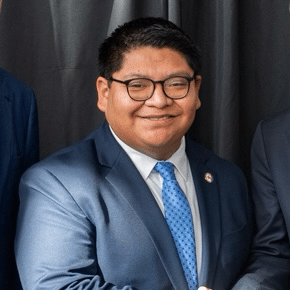
Lorenzo Pedro, UNC MPA current student
Degree: BA Psychology, minors in Photography and Spanish
Current Job Title:
Legislative Liaison for the North Carolina Department of Transportation
What are your areas of interest in the program?
My primary areas of interest involve enhancing my leadership skills to succeed in diverse professional environments while leveraging my background in curating and drafting legislation to deepen my understanding of policy implementation within an MPA program. This knowledge can be applied effectively in both the private sector and across different levels of government.
Why did you decide to get your MPA at UNC?
I chose UNC’s MPA Program because it is nationally recognized and offers students the opportunity to interact with professors and instructors who have extensive knowledge and real-world experience in public administration. The program’s flexibility caters to professionals like myself, allowing us to utilize our skilled backgrounds to engage in meaningful discussions and connect with fellow students. Moreover, UNC promotes an environment that encourages understanding of diverse perspectives, ultimately broadening our awareness of what is important in public administration.
Hometown: Charlotte, NC (currently resides in Washington, D.C.)
Alma mater: Tulane University
Degree: BA Sociology, Jewish Studies, minor in Political Science
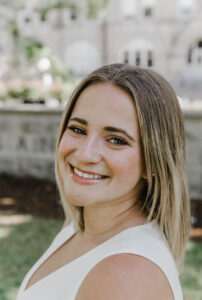
Current Job Title:
Associate Regional Director for BBYO
What are your areas of interest in the program?
When researching graduate programs in my area of interest, I immediately noticed that MPA at UNC truly has it all. The program’s focus on developing public service leaders despite their current occupation or interests stood out to me. As an aspiring nonprofit executive, I was originally hesitant to be entering a government-focused space, but upon looking through the curriculum and meeting my peers, I knew MPA@UNC was the right fit. I am confident I will gain skills in nonprofit management, organizational theory, financial management and general public service while learning from peers and instructors who serve in an array of public service jobs.
Why did you decide to get your MPA at UNC?
What stood out to me most about MPA@UNC was their focus on people. During my interview, Cara Robinson, director of admissions, mentioned that they are one of the few virtual graduate MPA programs that goes through an interview process. She explained that the reason for this is because, despite being completely virtual, they want to build a strong cohort of driven leaders. Graduate school, like undergrad, should not only be about learning texts and completing exams, it should also focus on the ability to engage and learn from classmates with varying backgrounds on a personal level. MPA@UNC is unique as it found a way to accomplish this completely virtually, allowing students to continue their full-time careers while getting the most out of a graduate program. I look forward to the ways in which MPA@UNC will allow me to grow as a public service leader.

Hometown: Currently resides in Fort Huachuca, Arizona
Alma mater: Florida State University
Degree: BA International Affairs
Current Job Title:
Military Intelligence Officer, United States Military
What are your areas of interest in the program?
My greatest areas of interest at this time are the degree concentrations in local government and nonprofit management. As I plan my transition from the military and into the real world, I find myself drawn to fields where I can still find purpose in serving the community and supporting the common good. Both the local government and nonprofit fields allow me those opportunities, and though I’ve learned a lot from my time in the military, I admittedly possess a lot of knowledge gaps regarding nonprofit and local government affairs. I look forward to learning all I can about both fields while enrolled with UNC.
Why did you decide to get your MPA at UNC?
The University of North Carolina at Chapel Hill is known throughout the country as a prestigious institution and from my experience carries an even higher degree of prestige throughout the southeastern United States. This level of institutional renown and the local government program’s top national ranking made the MPA@UNC an easy choice when it came time to decide where to enroll.
Thursday, February 2, 2023
5:00 p.m. – 8:00 p.m.
Tate’s Craft Cocktails
279 W. 4th Street
Winston-Salem, NC 27101
If you’re in town for the NCCCMA Winter Seminar, or if you are simply in town, join us for our first Happy Hour Hub of 2024! There is no charge but PLEASE let us know you’re coming by registering HERE. If you would like to help organize a Happy Hour Hub in your community, contact Brandon Foster at foster@sog.unc.edu or 919.962.0426.
Thursday, February 1, 2024 – 7:30 a.m.
M.C. Benton Convention Center, Gaines 2
Winston-Salem, NC 27101
This annual event hosted during the North Carolina City-County Managers Winter Conference is a great opportunity to (re)connect with MPA alumni, faculty, and staff, and to meet current students.
You don’t need to be registered for the conference to attend the breakfast, however, you do need to register by going HERE, scroll down and click the Register Now button below City and County Management Seminar. You may need to create a login and password but once you’ve done that, you’ll see an option to register for the breakfast.
If you are having any issues, you can reach out to Brandon at 919.962.0426 who can help you through the process.
This December the UNC MPA program will be welcoming 17 new graduates into our alumni community.
Read about a few of them below.
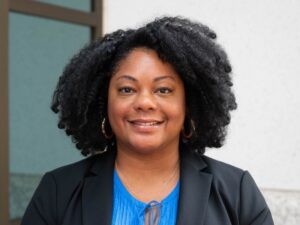
Amanda Wesson, UNC MPA Class of 2023
Hometown: Wake Forest, NC
Alma mater: North Carolina Central University
Degree: BA Psychology, MEd Communication Disorders
What’s your current title, and what do you do?
I am a speech-language pathologist of over a decade who most recently assessed preschoolers as part of a transdisciplinary team for a local school system. In this work, I used play therapy techniques to elicit responses for assessments to help determine young children’s needs. I also recently worked as an early childhood policy analyst with a non-profit organization. There, I helped coordinate events for legislators, synthesized information and provided policy considerations on various topics related to child care and early education.
What are your plans after graduation?
I recently signed on with Wake County Budget and Management Services to become a Budget and Management Analyst beginning in January! There, I will work closely with department staff to evaluate funding and program requests, collaborate to develop alternatives, and recommend approaches that align with the County’s overall objectives. I plan to engage in continuous learning activities and also hope to maintain my license and certification as a speech-language pathologist.
Looking back on who you were at the start of the program to who you are now, how have you changed?
Wow, it feels like so long ago, but I began this process as a direct provider and clinician. I knew I had a heart for public service and always strived to produce outcomes for public benefit. My experience led me to look at each case with an individualized lens. With the knowledge and connections I’ve gained from this program, I now have a head for public service—I’ve gained technical skills, theoretical frameworks, and practical experience. More than that, I’ve opened up myself to all the possibilities and ways I can contribute to my community and the communities of those I serve.
What is one class, one project, one faculty member, one experience, one discussion, or some other aspect of our program that had an impact on you and proved to be meaningful in your professional life?
I entered this program with a general idea of which direction I thought it would take me. However, I became interested in budget and management while taking PUBA 731 – Public Financial Management, taught by Monica Allen. I assumed it would be merely accounting, but it is much more comprehensive. It encompasses data, strategy, stakeholder and citizen engagement, problem-solving, and writing—many of the things that attracted me to the field of speech-language pathology. In taking this course, I realized how I could make a more significant impact at a macro level to support systems that provide education, public health, and human services.
A brief quote or piece of advice for those considering the UNC MPA or a career in public service?
The UNC MPA program has been instrumental in shaping my journey from a seasoned speech-language pathologist to an emerging public administrator in budget and management services. Embrace the opportunity to broaden your horizons, as the skills and insights gained here will empower you to make a meaningful impact in the lives of others.
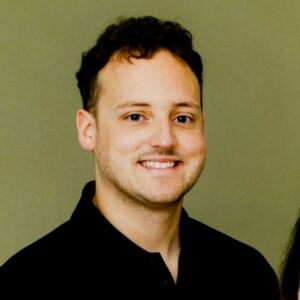
Shane Rudloff, UNC MPA Class of 2023
Hometown: Denver, CO
Alma mater: Ohio State University
Degree: BS International Relations
What’s your current title, and what do you do?
I am currently a Senior Grant Writer at a nonprofit called Growing Home in Westminster, CO. I build relationships with funders and secure grants for our programs which include a food pantry, a community garden, housing assistance, and early childhood education resources.
What are your plans after graduation?
After graduation I’d like to pursue a career in local government, preferably at the City Manager’s Office where I can interact with all kinds of stakeholders that work with government. I live by learning and enjoy observing the contexts and perspectives of different experts and professionals in the public sector.
Looking back on who you were at the start of the program to who you are now, how have you changed?
Looking back at who I was before I started the program, I’d say I’m much more cognizant of the inner workings of how the government operates. I was originally aware of the surface level details (elections, bills becoming law, politics, etc.), but now I understand there’s more that goes into getting things done (budgets, hiring the right people, working with private contractors, etc.). I have a more holistic view of how the public sector works.
What is one class, one project, one faculty member, one experience, one discussion, or some other aspect of our program that had an impact on you and proved to be meaningful in your professional life?
I would say that one class/experience that really stood out to me during my time at UNC was the immersion. I loved the opportunity to get to meet some of my peers in person which is a rarity for an online student. There I was able to meet some incredible professionals and people, and I am still very close friends with some of my classmates.
A brief quote or piece of advice for those considering the UNC MPA or a career in public service?
This is a pathway that provides an opportunity to help shape the way communities, states, and nations operate. It will make you a person people turn to when they are looking for solutions, and you will do little things daily that contribute to improving something. I take pride in that fact, and that is what public service is all about.
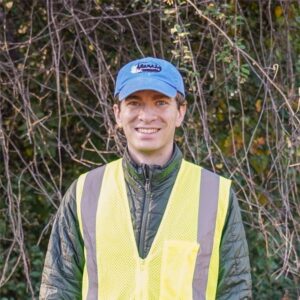
Joanthan Hill, UNC MPA Class of 2023
Hometown: Raleigh, NC
Alma mater: Duke University
Degree: Public Policy and History
What’s your current title, and what do you do?
My current title is Executive Director of Keep Charlotte Beautiful. I’m a full-time employee of the City of Charlotte, but it’s a little like running a nonprofit within the city government. The program has a City Council-appointed board, its own social media channels, and conducts some fundraising. An AmeriCorps service member (whom I manage) and I run numerous, community-driven initiatives related to litter prevention, waste reduction, and beautification.
What are your plans after graduation?
Throughout the MPA program, I’ve been able to apply lessons learned from class to greatly expand the programming scope and offerings of Keep Charlotte Beautiful. I hope to continue that after graduation. Two of my goals for the coming year are to launch a resident-operated ‘Friends of Keep Charlotte Beautiful’ spin-off nonprofit to enable easier fundraising for the program and to implement an in-depth litter study using our city’s Solid Waste Services department and students from UNC-Charlotte.
Looking back on who you were at the start of the program to who you are now, how have you changed?
When I applied for the program, I had just learned that I had received funding to hire an AmeriCorps service member for the first time, and wanted to hone in my leadership skills. The MPA program has enabled me to do that and more. In some instances, the MPA program enabled me to put a theoretical name to practices I was already implementing. In many others, it enabled me to consider new ideas and new ways of managing. I have become a more strategic-thinking, results-driven, and public-oriented manager because of it.
What is one class, one project, one faculty member, one experience, one discussion, or some other aspect of our program that had an impact on you and proved to be meaningful in your professional life?
As I mentioned to my oral exam panel, the idea of inspiring a shared vision from Kouzes and Posner’s The Leadership Challenge has stuck with me. Much of the work I do is collaborative, but a lot of it is driven by me, rather than being driven with the help of others. That message has reoriented my focus towards public engagement. In other words, I have what I think are a lot of great ideas, but they may not be what the public wants or even needs. Deploying a consensus-driven approach to tackling wicked problems provides for a more meaningful solution while broadening my perspective as a public servant.
A brief quote or piece of advice for those considering the UNC MPA or a career in public service?
Always consider how you might apply the lessons learned in class to your day-to-day work. Putting those theories to practice not only helps you learn more about them, it enables you to determine what works best for you.

Julia Murphy, UNC MPA Class of 2023
Hometown: Pittsfield, MA
Alma mater: Providence College
Degree: BA in Political Science, Minor in Public and Community Service Studies
What’s your current title, and what do you do?
I am a Special Assistant to the Deputy Secretary at the United States Department of Commerce. I directly support the Deputy Secretary by overseeing his external engagements, supporting the day-to-day operations of the office, and advising on policy matters. As a political appointee in the Biden-Harris Administration, most of our work is centered around advancing and implementing the President’s priorities.
What are your plans after graduation?
I’m only three months into my current job so I’m hoping to stay for a while! I was working in the Massachusetts State Legislature when I began the program, so making the leap to the federal government and working in the executive was a goal that I had for a while and I’m grateful I was able to achieve while obtaining my MPA.
Looking back on who you were at the start of the program to who you are now, how have you changed?
My time in the program has reaffirmed that I want to be in public service for as long as I can. Taking classes while getting real-world experience allowed me to develop a public administration lens that I use every day to think about challenges, potential solutions, and how to move the needle forward. My decisions are directly informed by the frameworks and practical applications that I encountered in my courses. My ability to communicate concisely and effectively has significantly improved, and taking a deep dive into my leadership abilities has given me tremendous confidence both personally and professionally.
What is one class, one project, one faculty member, one experience, one discussion, or some other aspect of our program that had an impact on you and proved to be meaningful in your professional life?
This is such a hard question because I have genuinely learned so much from every professor, class, and classmate I’ve had! I think back to Prof. Julie Bregman’s Institutions and Values course that I took in my first semester of the program where we talked about equity as a core and competing value of public administration. When talking about equity versus effectiveness, I remember having a lightbulb moment where I said something along the lines of, “If programs aren’t working for the people they are intended to serve equitably, are they effective at all?” From this point forward, equitable public administration has been top of mind for me and has driven my focus areas in the program and the way that I think about the world, and is something I hope I can continue to foster as a public service leader. Government is a powerful tool to help people, and I would push back on anyone who claims that you can’t have equity and efficiency at the same time. It may not be easy, but it is our job as leaders to find a way forward.
A brief quote or piece of advice for those considering the UNC MPA or a career in public service?
The answer to both is simple — do it! There are a lot of complex challenges that our world faces and we need bold, courageous, thoughtful, and visionary leaders to take those challenges on. The UNC MPA equips you with the tools to tackle those problems, and you learn from the best and brightest faculty and classmates. Public service is an honorable undertaking and allows you to make an impact on other people’s lives in a way that other professions don’t offer. The MPA program was one of the best choices I’ve made and I feel incredibly well-prepared for wherever my path may take me.